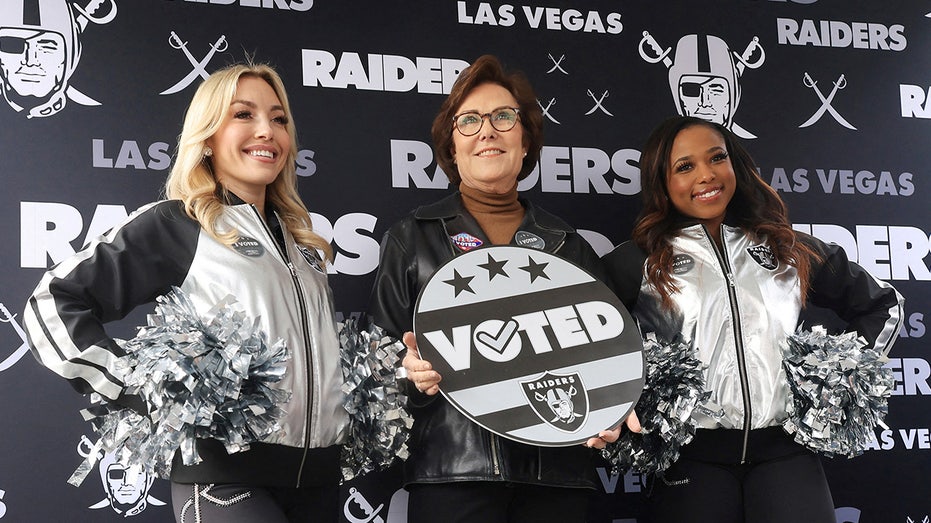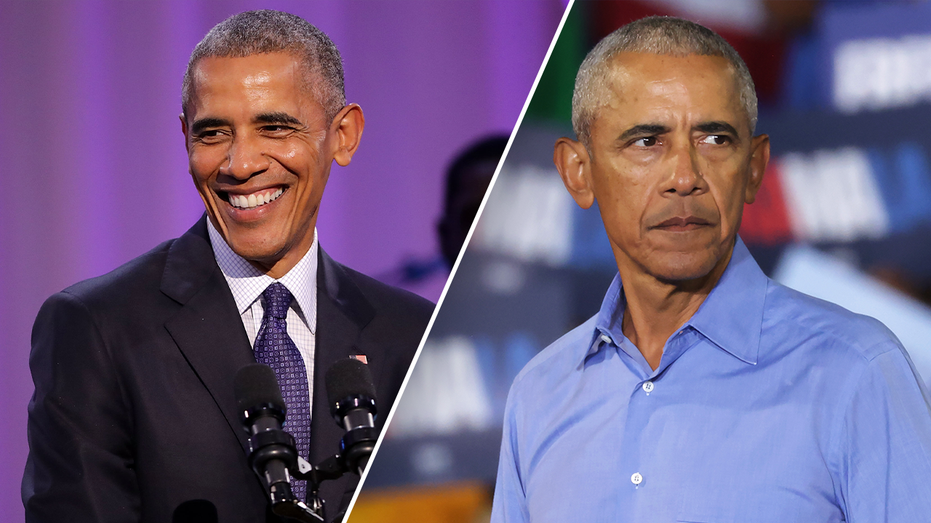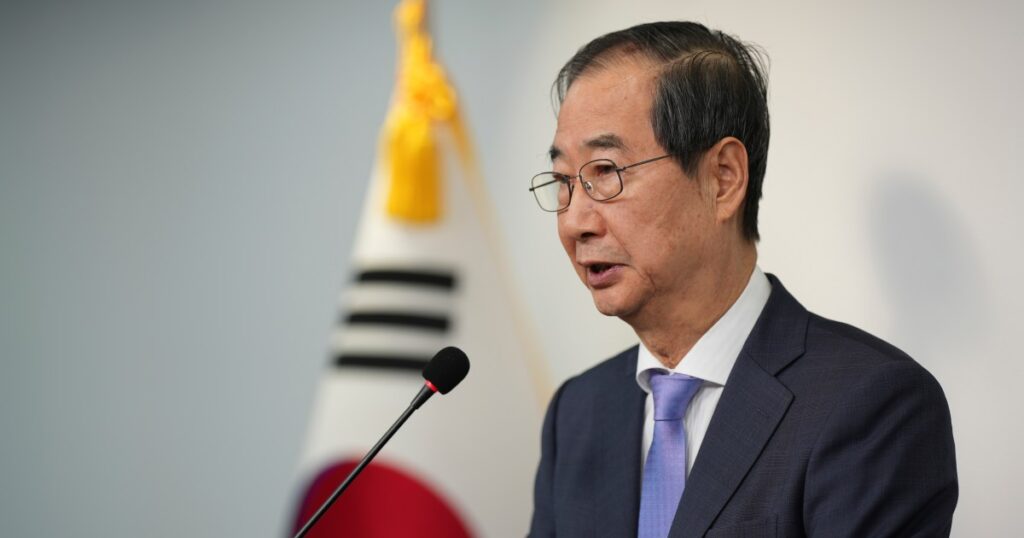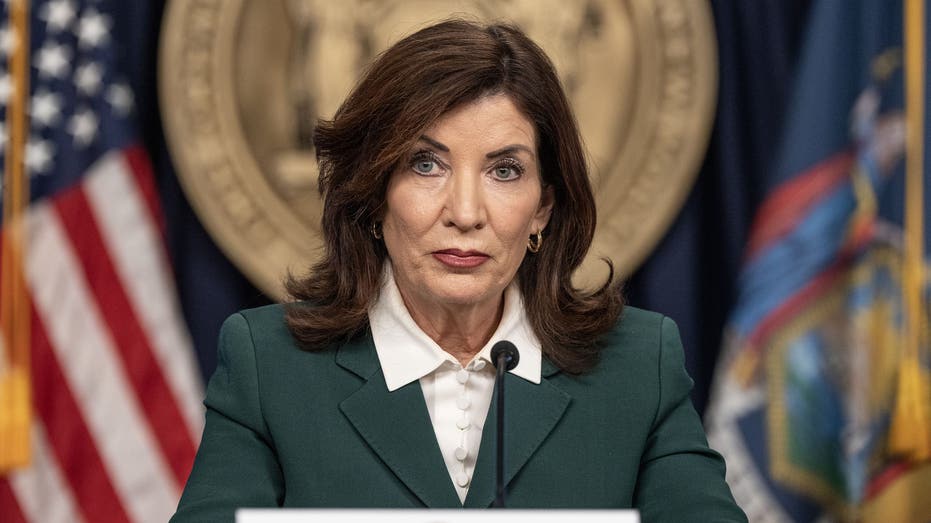Watch: Tamil Nadu BJP chief Annamalai whips himself as he protests over sexual assault at Anna University

Annamalai was seen whipping himself and after he completed his six-whip, one of the men standing behind rushed towards him and stopped him from further whipping himself.
Dem senator reveals how she narrowly won key state that Trump flipped: ‘Be practical to find results’

Sen. Jacky Rosen, D-Nev., who just won re-election narrowly in a state that also went to President-elect Trump, is advocating for Democrats to make Nevada the first in the nation primary in the 2028 presidential election. “We are so proud to look like the rest of the nation. We’re the most – one of the most ethnically diverse states,” she said in an interview with Fox News Digital. In a memo earlier this month, Nevada’s Democratic Party also made the argument that the state should go first in the next presidential race. REPUBLICANS HAMMER BIDEN FOR FEDERAL DEATH ROW REPRIEVES AHEAD OF LEAVING OFFICE “If Democrats want to win back working class voters and rebuild our broad coalition of voters of color, we should elevate the most working class and most diverse battleground state in the nation to be the first presidential preference primary for the 2028 cycle,” wrote state party Chair Daniele Monroe-Moreno, reported the Nevada Independent. Rosen listed some of the attributes Nevada’s residents have that make it a great place for Democrats to start. “We have one of the fastest growing Asian-American Native Hawaiian Pacific Islander populations in the nation. We have a really robust and engaged Black community,” she explained. “We are a strong union state – heavy labor state. We have tourism. We can talk about tourism – top economic driver in every state in this nation.” TOP TRUMP AIDES JOIN GROUP PREPPING TO SHORE UP SUPPORT FOR MAGA AGENDA DURING SECOND TERM “What I would hope is that anyone who wants to be the leader of the Democratic Party… if they come to Nevada, they can hear from a diverse group of businesses, of individuals – with about 200,000 veterans,” the senator said. “Come hear from our small businesses, our veterans, our seniors, all of the different groups. You’ll be able to hear what people are worried about again and what they hope for,” she added. The Democratic senator’s angling for Nevada to have the first primary in 2028 comes as Democrats prepare to select a new party leader. Democratic National Committee (DNC) Chairman Jaime Harrison announced his intention to step down following the 2024 election. A number of Democrats have already announced their bids to be the next leader. SENATE PASSES BILL TO STOP SHUTDOWN, SENDING IT TO PRESIDENT BIDEN’S DESK The campaign for Nevada to be the first primary also comes after a decision to make South Carolina’s primary first in the 2024 election caused significant pushback, particularly from New Hampshire, which had previously held the title of the first-in-the-nation Democratic primary. Rosen also reflected on her narrow electoral win against Republican candidate Sam Brown and running ahead of Democratic presidential nominee Kamala Harris. “Nevada races are always tight,” she prefaced. According to the Democrat, “I will tell you that my motto really is: Agree where you can. Fight where you must. Be practical to find results.” BRIEF GOVERNMENT SHUTDOWN USHERED IN BEFORE CHRISTMAS AS SENATE WORKS TO ADVANCE HOUSE BILL Rosen emphasized her bipartisan efforts during her campaign, pointing to several groups that had ranked her among the most bipartisan members of Congress and the Senate. “I’ve been able to deliver for Nevada, making me one of the most bipartisan, effective and independent senators, always putting Nevada first,” she said. Her advice for Democrats across the country, including those running in competitive races in 2026, is “be present. Be engaged. Listen to people. Find out what they’re worried about. Find out what they hope for. Be practical and do those things. Be practical and find the places where you can agree.”
‘Greater reckoning’: Obama’s spot in the Democratic sun fading after Harris loss

Former President Barack Obama’s years of dominating Democratic Party politics may be drawing to a close, as he and party leaders will likely face a “greater reckoning” after Democrats’ losses in the 2024 election, experts predict. The whirlwind presidential election saw the Democratic Party rally around both President Biden and Vice President Kamala Harris as their nominee at separate times – all with Obama’s seal of approval. The political landscape shifted with a single tweet from Biden on a Sunday July afternoon, with Obama and his allies deeply entwined with efforts to navigate the party to what they hoped would be an electoral victory come Nov. 5, a look back at the cycle shows. President-elect Trump notched a decisive win last month, racking up 312 electoral votes to Harris’ 226 and taking a victory lap for what the media has described as an “historic political comeback” that has shaken the Democratic establishment as they pivot to combating Trump 2.0 and his policies. “I think there are going to be big demands for a greater reckoning. The Democratic politburo – Obama, Pelosi, Schumer, Jeffries and others – all participated in the obvious lie that Biden was capable of a second term, in the anti-Democratic move to install a wholly untested Vice President Harris,” Democratic strategist Julian Epstein told Fox News Digital when asked about Obama’s legacy following the election. “And in lacking the courage for the past four years to stand up a progressive left whose policies are far out of touch with most voters.” “They all failed the test of leadership in this respect.” OBAMA ALLIES, ADVISERS HELPED LEAD THE CHARGE AMONG DEMS LOOKING TO SINK BIDEN AHEAD OF OFFICIAL ANNOUNCEMENT This month, Obama delivered a speech at the 2024 Obama Democracy Forum, which earned him a headline on MSNBC, reading, “Obama still doesn’t get why Trump won. That’s the problem.“ “Obama’s characteristic rhetorical virtues were on full display. He was a constitutional law professor before he was a politician, and he still sounds like one. At the same time, he was a once-in-a-generation talent as a political communicator. He knows how to convey a complex set of ideas in a digestible and appealing way,” the op-ed read. “But there was a massive gaping hole at the center of his speech. He still doesn’t understand why his eight years in power culminated in the rise of Trump,” the op-ed continued, arguing that the “first step” to better respond to Americans’ demand for change from the status quo “is to stop listening to Barack Obama.” BLUE STATE DEMOCRATS ISSUE SCATHING REFLECTION ON ELECTION LOSS: ‘WE’RE OUT OF TOUCH’ The Democratic Party and Harris campaign have been dragged by some allies, such as Vermont Sen. Bernie Sanders, for moving away from working-class voters while Trump rallied their support. Harris came under fire, for example, for featuring Hollywood celebrities and musicians during her campaign rallies, which were viewed as tone-deaf as Americans struggled with inflation, and their anxiety mounted over ongoing wars in Israel and Ukraine. Now, the Democratic Party is in the midst of a reckoning over the failed election efforts, which saw the White House and Senate flip red and the House remain in the GOP’s control. “Harris’ advisers blame everything but themselves for their loss,” an op-ed published in the Washington Post this month reads. The piece took issue with how a handful of Harris campaign staffers joined the left-wing “Pod Save America” podcast, which is hosted by former Obama aides, and defended their work on the campaign. David Plouffe, Jennifer O’Malley Dillon, Stephanie Cutter and Quentin Fulks joined the show – all of whom, except Fulks, previously worked for Obama’s presidential campaigns or administration. “What the four never did is directly admit any major mistakes they made. ‘We should have really pushed Harris to distance herself from President Biden’; ‘Maybe we spent too much time in Arizona’ (Harris lost there by 6 percentage points); ‘We should have had a Palestinian speaker at the Democratic National Convention.’ There were no blunt statements like that,” the op-ed read. NANCY PELOSI FIRES BACK AT BERNIE SANDERS FOR COMMENTS ON DEMS’ SWEEPING ELECTION LOSS: NO ‘RESPECT’ While the New York Post editorial board declared in a headline following the election: “Trump and America bury the Obama doctrine.” When “Obama installed Kamala Harris as the latest face of his revolution, the American public of all colors, ages and genders finally called time,” the Post editorial board argued. “Voters at last saw through the industrialized demonization of Trump and woke up to the truth that his policies are far closer to the American ideal and what they consider normal.” “Let’s all pray that our self-proclaimed betters in their Martha’s Vineyard mansions will finally realize that this was the death of ‘Obamaism’ once this latest thumping fully sinks in,” they concluded. Amid the unprecedented election cycle for Democrats, Obama and his longtime allies have been entwined with Biden’s exit and Harris’ rise and fall as the nominee. Concerns over President Biden’s mental fitness had circulated for years, heightening last winter when Special Counsel Robert Hur, who was investigating the president’s alleged mishandling of classified documents when he was vice president, characterized Biden in his report as “a sympathetic, well-meaning, elderly man with a poor memory.” 5 MISTAKES THAT DOOMED KAMALA HARRIS’ CAMPAIGN AGAINST TRUMP Biden’s actions on the national and international stage soon came under further scrutiny, showcasing a handful of gaffes and miscues, including Obama taking Biden’s wrist to seemingly lead him offstage at a fundraiser in LA in June, and Italian Prime Minister Giorgia Meloni directing Biden back to a gaggle of world leaders in Italy that same month, and data showing Biden frequently delivered remarks to supporters at campaign rallies for a shorter amount of time than a sitcom. Amid the controversy, however, Obama was seemingly acting as Biden’s political closer to help lock up votes and donations, joining the 46th president at swank fundraisers in California and New York City, and at a
Kerala Lottery Results December 27: NIRMAL NR 412 Friday lucky draw result TODAY 3 pm

The latest draw is designated as NIRMAL NR 412 Friday. Winner will receive a bumper prize Rs 70 Lakhs.
Unlikely political ‘Thor’ emerges from South Korea’s martial law crisis

Seoul – South Korea’s National Assembly Speaker Woo Won-shik has emerged as an unlikely symbol of leadership during the country’s ongoing political turmoil, triggered by President Yoon Suk-yeol’s brief declaration of martial law on December 3. Despite holding South Korea’s second-highest office after the presidency, the assembly’s speaker has historically had a low-profile role, operating behind the scenes of political life. Unlike the Speaker of the United States House of Representatives, who drives Washington’s legislative agenda as the leader of the majority party, South Korea’s parliamentary speaker is required by law to renounce party affiliation upon election to maintain neutrality. The majority of speakers also retire after their term. But Woo’s decisive yet measured actions throughout the recent crisis appear to have upended the traditional view of the speaker and their role. “Seeing someone like him step up and act decisively in such a critical moment was refreshing,” Yoo Junghoon, a lawyer and political columnist, told Al Jazeera. Advertisement “It allowed voters – both young and old – to realise that such capable politicians still exist,” Yoo said. South Korean youth even gave Woo the nickname “National Assembly Thor” — a nod to his gavel of office and the Marvel superhero’s wielding of his mighty hammer. A recent Gallup Korea poll showed that 56 percent of respondents expressed trust in Woo, an unusual figure in a country where trust in the National Assembly has fallen to just 20.6 percent, according to an OECD survey 2024. Student protester to ‘Thor’ of constitutional procedure As a young student activist, Woo was imprisoned for three years after protesting against the military dictatorship that expanded martial law in 1980, following the assassination of President Park Chung-hee in 1979. The crackdown culminated in the deadly Gwangju Uprising of May 1980. After President Yoon declared martial law on the night of December 3, the 67-year-old Woo scaled the National Assembly fence after police barricaded the entrance to try and prevent lawmakers from entering and holding a vote to overturn the president’s order. “I knew we had the constitutional authority to lift martial law,” Woo recalled later in a news conference. “I didn’t hesitate. I had to get inside the assembly, no matter what,” he said. National Assembly Speaker Woo Won-shik during a news conference at the National Assembly in Seoul, South Korea, on December 19, 2024 [Kim Hong-Ji/Reuters] Even as South Korean special forces soldiers advanced on the assembly building, Woo insisted on following the correct legislative procedures despite mounting pressure from anxious politicians urging him to speed up the process by possibly cutting a few corners. Advertisement “In moments like this, following the correct procedure without error is even more vital,” Woo told his worried colleagues in the surrounding assembly chamber. At one point, troops came dangerously close to entering the main chamber where lawmakers were voting, prompting a tense standoff with assembly staff. The crucial vote proceeded, with all of the 190 lawmakers present – of the 300-seat Assembly – voting in favour of repealing martial law. A military helicopter flies around the National Assembly in Seoul after South Korean President Yoon Suk-yeol declared martial law on December 3, 2024 [Yonhap via Reuters] “There were many reactions on social media questioning why [Woo] was so fixated on following legislative procedures,” Yoo, the political columnist said. “But now, even those opposing impeachment [against President Yoon] can’t find fault with the process he upheld,” Yoo said. Bong Young-shik, a research fellow at Yonsei University’s Institute for North Korean Studies, attributed the peaceful resolution of the chaotic situation, without civilian casualties, to Woo’s emphasis on adhering diligently to constitutional procedures. “In such an unexpected and grave situation, both conservatives and progressives found Woo trustworthy,” Bong said. “We saw that this approach worked exactly as intended,” he said. ‘South Korea is strong. Its people are resilient’ Woo also adhered to strict constitutional procedures during the first, failed impeachment vote against President Yoon, on December 7, for declaring martial law and plunging the country into crisis. Advertisement With Yoon’s governing party boycotting the vote to block the impeachment attempt, Woo kept the legislative session open for hours, an unusual move, urging politicians to return and fulfil their constitutional duty to cast a vote. Two governing party lawmakers did return to the chamber to cast their ballots. Woo only closed the session at about 9:20pm, explaining that he could no longer let the protesters, who had gathered outside the assembly in freezing weather to demand Yoon’s impeachment, wait indefinitely for a result. After the successful, second impeachment vote held a week later, Woo called for a return to normalcy in all aspects of life in South Korea and for the public to move forward together. “I hope your year-end is a bit happier,” Woo said at the time, encouraging South Koreans to resume Christmas holiday celebrations and gatherings, mindful of the toll the turmoil had taken on struggling small businesses at a key time of year. “His words conveyed meaning instantly,” said Yoo, the political columnist. Woo has acknowledged his rising public profile and newfound popularity, but with rare humility. “I heard young people call me the ‘National Assembly Thor’. I find it amusing,” he said during a recent news conference. He attributed the newfound public attention on the speaker’s role in politics not to himself personally, but to the collective efforts of the assembly’s lawmakers, staff, as well as engaged citizens. Asked about his own future ambitions, including a potential presidential bid, Woo dismissed the idea. Advertisement Instead, he emphasised the need for constitutional reform to address the recurring instability that has plagued South Korea’s presidencies since its transition to democracy in 1987. People celebrate after the South Korean parliament passed a second impeachment motion against President Yoon Suk-yeol over his martial law decree, on December 14, 2024 [Kim Hong-Ji/Reuters] “Our current constitution, drafted in 1987, is outdated,” he said, adding that it needed “reforms that reflect the societal changes of the past four decades”. Woo also had
What climate records were broken in 2024?

This year, 2024, is set to become the hottest on record, surpassing the previous high in 2023, according to the European Union’s Copernicus Climate Change Service (C3S). For the first time, average global temperatures will exceed 1.5C (2.7F) above pre-industrial levels from 1850-1900, the upper limit set by the Paris Agreement. The agreement aimed to have countries work towards reducing global greenhouse gas emissions, with a goal of limiting the global average surface temperature increase to 1.5C above pre-industrial levels and striving to keep it well below 2C. “This does not mean that the Paris Agreement has been breached, but it does mean ambitious climate action is more urgent than ever,” said Samantha Burgess, deputy director of C3S. Rising temperatures have already triggered extreme weather events across the globe in 2024, including deadly floods in Nigeria and Europe, devastating wildfires in South America, early heatwaves and catastrophic hurricanes in the United States. Left to right: Floods in Nigeria [AFP], wildfires in Brazil [AP], the aftermath of a hurricane in Barbados [AP] JANUARY The year began with a fiery start as the world experienced the warmest January on record, with an average surface air temperature of 13.14˚C. This is 0.12˚C above the previous temperature record for the warmest January, which was set in 2020. January 2024 marked the eighth consecutive month in a row that was the warmest on record for the respective month of the year – a streak that began in June 2023 and ended in June 2024. (Al Jazeera) FEBRUARY In February, the Northern Hemisphere concluded its warmest winter on record, while ocean temperatures soared to unprecedented levels. The average global sea surface temperature reached 21.09C (69.8F), surpassing the previous record of 20.98C (69.77F) set in August 2023. (Al Jazeera) While this increase is partly attributed to the El Nino climate pattern, which causes unusually warm waters in the eastern Pacific, its reach is broader. “What is more surprising is that sea surface temperatures are at record levels in regions far from El Nino’s centre, such as the tropical Atlantic and Indian Ocean,” noted Richard Allan, a climate scientist at the University of Reading, emphasising the profound impact of rising greenhouse gas emissions on global warming. JUNE As sea temperatures increase, evaporation speeds up, transferring more heat from the oceans to the air. When storms move over warm oceans, they absorb more water vapour and heat. This leads to stronger winds, heavier rainfall and greater flooding when the storms reach land. This was seen when the Atlantic entered its hurricane season in June. Hurricane Beryl, the season’s first hurricane, was the earliest Category 5 on record in the Atlantic, according to the United Nations’ World Meteorological Organization. Category 5 hurricanes cause catastrophic damage with winds of 157mph (252km/h) or higher. Beryl formed in the Atlantic Ocean on June 28 and rapidly intensified into a major hurricane. Between June 29 and the morning of June 30, its winds surged by 65 miles per hour, reaching “extremely dangerous” Category 4 status. Adblock test (Why?)
South Korea’s acting president faces impeachment vote as currency plunges

Main opposition Democratic Party’s bid to suspend acting leader Han Duck-soo plunges country into further uncertainty. South Korea’s legislature is set to vote on the impeachment of its acting president as ongoing turmoil in Asia’s fourth-largest economy sent the won plunging to levels not seen since the 2007-2009 global financial crisis. The main opposition Democratic Party (DP) is pushing to impeach Han Duck-soo, the prime minister, in a vote at the National Assembly on Friday after accusing the acting president of being complicit in an attempted insurrection by suspended President Yoon Suk-yeol. The DP, which holds 170 seats in the 300-member legislature, submitted the impeachment motion on Thursday after Han refused to fill three judicial vacancies on the court set to adjudicate Yoon’s impeachment trial following his short-lived declaration of martial law. Han’s People Power Party (PPP) has argued that only the elected president has the authority to appoint justices to the Constitutional Court. At least six judges on the court must uphold Yoon’s impeachment to remove him from office. The court currently only has six justices following the retirement of three judges earlier this year, meaning that the bench would have to deliver a unanimous ruling to strip Yoon of the presidency. Advertisement The court is set to hold its first hearing on Yoon’s impeachment on Friday and could take up to six months to deliver its ruling. Yoon, who has defended his martial law declaration as legal and aimed at tackling “anti-state forces”, is also under criminal investigation on suspicion of insurrection and abuse of power. The bid to impeach Han, less than two weeks after he took up his role following Yoon’s impeachment, plunges South Korea into further political uncertainty as the country is still reeling from Yoon’s martial law decree on December 4. While a two-thirds majority of the National Assembly is required to impeach a sitting president, there is no consensus on whether the same threshold applies to an acting leader. The PPP has argued that two-thirds of lawmakers must approve Han’s impeachment. DP contends that he can be suspended if 151 lawmakers back impeachment since the constitution provides for the removal of Cabinet members by a simple majority vote. With the DP, minor opposition parties and independents holding 192 seats, at least eight PPP lawmakers would need to cross the aisle to reach the two-thirds threshold. If Han is impeached, Deputy Prime Minister and Finance Minister Choi Sang-mok will assume presidential duties. Choi on Friday warned that impeaching Han would deal a serious blow to the country’s economic standing and urged the opposition to reconsider its bid. “The economy and the people’s livelihoods are walking on thin ice under a national state of emergency, and it cannot cope with any greater political uncertainty that will result from another acting president assuming the acting presidency,” Choi said. Advertisement The South Korean won fell sharply against the US dollar on Friday, falling below 1,480 won for the first time since March 2009. Adblock test (Why?)
‘BMW if for PM, my cars is Maruti 800’: UP minister Asim Arun who served as Manmohan Singh’s bodyguard remembers ex-PM

Asim Arun is the first IPS officer trained as a Black Cat commando by the National Security Guard (NSG) in 2004.
Hochul signs bill that will charge oil and gas firms $75B, but critics say customers will really foot the tab

Today New York Governor Kathy Hochul signed into law the Climate Change Superfund Act, which will charge oil and gas firms an estimated $75 billion over the next 25 years. The controversial measure, sponsored by Senator Liz Krueger and Assembly Member Jeffrey Dinowitz, is modeled on federal and state superfund laws, which charge firms accused of pollution. While environmental groups heralded the legislation, business groups argued that it will increase the cost of doing business in the state and that consumers will ultimately bear the brunt in terms of higher energy prices. WHAT COULD HAPPEN TO GAS PRICES IF BIDEN ISSUES NEW SANCTIONS AGAINST RUSSIAN ENERGY SECTOR? “The Climate Change Superfund Act is now law,” said Senator Krueger. “Too often over the last decade, courts have dismissed lawsuits against the oil and gas industry by saying that the issue of climate culpability should be decided by legislatures. Well, the Legislature of the State of New York – the 10th largest economy in the world – has accepted the invitation, and I hope we have made ourselves very clear: the planet’s largest climate polluters bear a unique responsibility for creating the climate crisis, and they must pay their fair share to help regular New Yorkers deal with the consequences.” However, critics have deemed the bill impractical and contend that it will be subject to protracted legal challenges. “What would you have them do? Not sell fuel in New York State,” said Ken Pokalsky, vice president of the New York State Business Council. A group of business and industry leaders also lambasted the measure: “This legislation is bad public policy that raises significant implementation questions and constitutional concerns. Moreover, its $75 billion price tag will result in unintended consequences and increased costs for households and businesses.” However, Gov. Hochul heralded the legislation as a victory for the state’s citizens, stating that the funds will be used for climate mitigation efforts. “This bill would allow the state to recoup $75 billion from major polluters…For too long New Yorkers have borne the costs of the climate crisis, which is impacting every part of the state.” The bill will result in significant assessments for both domestic and foreign energy producers, with Saudi Aramco of Saudi Arabia likely facing the largest charge at $640 million a year, while state-owned Mexican firm Pemex will be looking at a $193 million annual charge. Russia’s Lukoil will likely face charges of around $100 million per year. The assessments are based on estimated yearly CO2 emissions, measured in millions of tons of greenhouse gases. In total, 38 firms deemed carbon polluters will be on the hook, including American oil giants Exxon and Chevron, the UK’s Shell and BP, and Brazil’s Petrobras. Critics of the legislation have also noted the potential difficulty in collecting the stipulated assessments from foreign firms. The bill is also concerning consumer advocacy groups in light of its implementation in conjunction with other new measures which stand to greatly affect commuters and consumers: “We also note this measure would come on the heels of the reinstatement of congestion pricing in New York City, and in advance of the Environmental Department’s pending `cap and invest’ rule, which combined will also impose billions of dollars in new assessments on fossil fuel usage, impacting a wide range of consumers,” stated bill opponents.
China is building ‘world’s largest’ dam on Brahmaputra, should India be worried?

China’s mega hydropower project on the Yarlung Tsangpo river raises concerns in India over reduced Brahmaputra water flow and regional impact.
